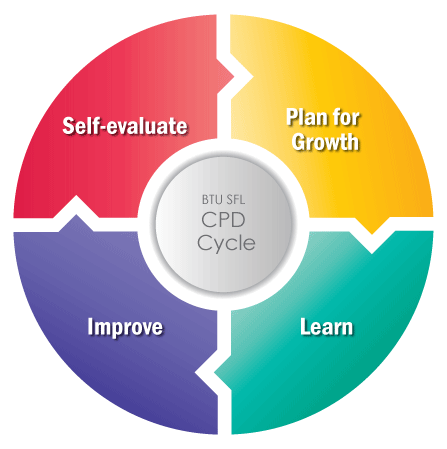
Continuous Professional Development Policy
Mission
The mission of the Continuous Professional Development (CPD) Unit* at BTU SFL is to facilitate teacher development and organize activities that encourage professional growth in individual instructors and the quality of the institution as a whole. As such, it addresses the needs of the students and teachers reciprocally.
The SFL encourages the collective and individual development of its instructors by planning professional development activities designed by the CPD Unit in the light of the evidence stemming from three main sources: (1) the institutional priorities, (2) the data gathered from the instructors and students through the feedback surveys, the micro-macro feedback sessions, and student focus group meetings, and (3) the issues arising from the lesson observations.
The aims of the CPD Unit are:
- To promote high-quality professional practices to meet international standards
- To introduce new instructors to our institutional values of professionalism and development
- To encourage and facilitate self-reflection and evaluation
- To organize collaborative development activities to enrich and improve our professional growth

Continuous Professional Development (CPD) Office
In line with the above mission and aims, the CPD office offers the following major categories of activities:
- Collaborative CPD Activities
- Surveys
- Guides, posters, wall charts, information packs
The CPD Unit also analyses the results of feedback surveys, student focus group meetings, and instructors’ micro-macro feedback sessions, which are conducted and implemented by the academic coordinator, in collaboration with the SFL management to plan seminars, workshops, and conferences, as well as action research for the professional development of its staff. Through in-service training events supported by the SFL, the staff benefits from the opportunity to participate in regular professional development activities. While CPD events are voluntary in the SFL, instructors themselves decide in what areas they need to develop. This decision is often based on the views they gain after certain CPD activities triggered by the feedback sessions, the discussion with a colleague, the trainer, or the manager, participating in training, attending a workshop, and so on. The instructors also tend to look for various ways to realize their full potential and determine the developmental activities they want to carry out accordingly.
The CPD collaborates with the SFL management to design a Performance Evaluation System (PES) to address instructors’ potential based on self-assessment and positive thinking. The CPD Unit promotes using the European Profiling Grid (EPG) as a self-assessment tool based on a “bottom-up” teacher development perspective. The EGP is an assessment tool used and conducted by the SFL management and its results are shared with the CPD unit. The instructors are encouraged to discuss, identify, and reflect on the significance of their EPG results and develop a specific short-term plan of action to enhance their professional development (Professional Growth Plan). Adopting their Professional Growth Plans, the instructors are eventually encouraged to have focused peer observations conducted in a climate of trusting relationship between the observer and the teacher. The PES cycle includes reflection both on the action and on the obstacles during the period of the implementation of the PEG action plan. The CPD Unit also conducts professional development talks with the staff in collaboration with the SFL management.
A good instructor at the SFL must employ certain strategies to achieve professionalism and personal growth by reaching the criteria for Performance Evaluation that fall under three categories:
(1) Professional Accountabilities
(2) Professional Development Activities
(3) Optional Activities
| Professional Accountabilities | Professional Development Activities |
Optional Activities |
|
|
|
Additionally, the SFL allows and encourages its instructors to complete their master's or PhD degrees while working for the institution. Instructors enrolled in graduate programs are allotted one day per week to attend their classes. In connection with the academic needs of staff members, the SFL encourages its staff to participate in academic conferences in Turkey and abroad. BTU meets the expenses of academic staff participating in academic conferences and activities within the Higher Education Law, No. 2547 regulations.
In order to develop and apply an effective policy of professional development for our teaching staff, the CPD Unit also analyses and evaluates the results of different surveys, which are carried out throughout the academic year:
Student Feedback Survey:
This survey is conducted at the end of each academic quarter. Students assess their instructors in terms of the instructor’s ability to use course materials effectively, answer questions appropriately, and create an environment conducive to learning. The survey results and the students' comments regarding their instructors are evaluated by the SFL management and reported to the individual instructors.
Coordinator Feedback Survey:
This survey is delivered to the staff each academic year specifically for the assessment of Units and Coordinators. Instructors assess the Units and Coordinators in terms of planning and organization, communication, teamwork, decision-making and problem-solving, managing change and improvement of the course, and responsiveness to complete the unit tasks in a timely manner. The results of the survey and the comments made by the instructors regarding each Unit are reported to the relevant Coordinators by the SFL management.
SFL Management Feedback Survey:
This survey is delivered to the staff each academic year specifically to assess Assistant Directors’ and Department Head’s performance to improve the quality of the foreign language education at BTU SFL. Instructors assess the assistant directors in terms of planning and organization, communication, teamwork, decision-making and problem-solving, availability, managing change and improvement of the course, and responsiveness to complete the unit tasks in a timely manner. The results of the survey and the comments made by the instructors regarding each Assistant Director and the Department Head to the SFL director.
Following the analysis of the survey results, the shortcomings, needs, and expectations of our instructors are identified. The CPD Unit - in collaboration with the SFL management, fellow Coordinators, and instructors - addresses these needs by arranging seminars, workshops, and other professional development events throughout the academic year.
Instructor Orientation Policy
The orientation and training processes of new students and instructors to the SFL are important for us. The academic coordinator plans, organizes, and executes the student and staff orientation policy of the SFL. Selected instructors first meet with our Director, Assistant Directors and Department Head. In this meeting the general structure of the SFL, its processes, and its procedures are explained. Both the SFL’s expectations from its instructors and the instructors’ expectations from the SFL are discussed. If newly recruited instructors are inexperienced in teaching, the CPD Office prepares an observation schedule for them so that they can benefit from more experienced staff.
After this general meeting, instructors are assigned to Units and/or Offices according to the needs of the SFL. Each Coordinator holds regular meetings with his/her Team members to explain the procedures that are followed within the Unit and/or Office, the relevant course materials, and the procedures for accessing supplementary materials related to that skill. Coordinators are also available to answer any new Team members' questions.
* In this text, the words Office and Unit are used interchangeably.
